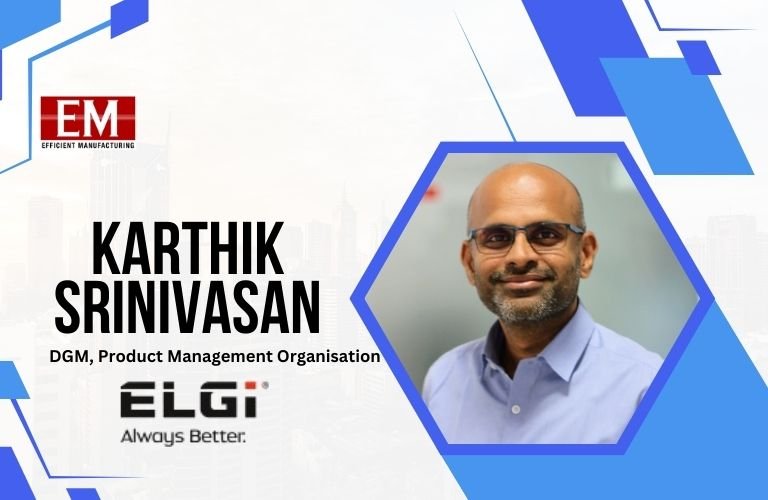| In this insightful interview, Kaushal Dighavkar speaks with Subburathinam P, Chief Strategy Officer at TeamLease, about the evolving hiring landscape in the UK manufacturing sector. The discussion explores the increasing demand for specialised skills driven by Industry 4.0 and how TeamLease is addressing workforce challenges through innovative training and apprenticeship programmes. Subburathinam also shares key strategies for manufacturers looking to build a strong employer brand in today’s competitive market.
Q. What trends are you seeing in the manufacturing sector’s hiring practices as demand increases? Are there specific skill sets that are more in demand now than before?
The Indian manufacturing sector is experiencing a significant uptick in hiring, driven by increased demand and several key trends like the adoption of Industry 4.0 technologies is a major trend. Companies increasingly seek professionals skilled in artificial intelligence (AI), machine learning (ML), and industrial automation to enhance manufacturing processes and improve efficiency. The sector has seen a growth in R&D-related jobs, reflecting the importance of innovation. Companies are investing heavily in R&D to stay competitive, creating a high demand for research-driven professionals. Skills in data science, cloud computing, cybersecurity, and robotic process automation (RPA) are highly sought after. The focus on upskilling employees to meet the demands of new technologies is evident, with many companies investing in training programs. Also, a growing emphasis on sustainability is growing, leading to a higher demand for experts in renewable energy, eco-friendly materials, and sustainable engineering solutions.
Q. With rapid growth in the manufacturing industry, what are some of the biggest challenges manufacturers face in attracting qualified talent?
One of the most pressing issues is the mismatch between the skills available in the workforce and those required by modern manufacturing processes. With the rise of Industry 4.0, there is a high demand for skills in automation, AI, data analytics etc. The industry is experiencing a labor shortage, particularly in specialized roles. There is a significant need for continuous upskilling and reskilling of the existing workforce to keep up with technological advancements.This shortage is exacerbated by an aging workforce and the slow pace of new talent entering the field. Retaining skilled workers is another major challenge. Competitive industries and the lure of higher salaries and better working conditions elsewhere make it difficult for manufacturers to keep their best talent. Talent availability often varies significantly across different regions. While urban areas may have a higher concentration of skilled workers, rural areas, where many manufacturing plants are located, often face a shortage of qualified personnel
Q. Given the talent shortages in certain areas of manufacturing, how are companies working with HR firms like TeamLease to bridge the gap through vocational training and upskilling programs?
As of now only 2.2% of people aged 15–59 have received formal vocational training. To bridge this gap, partnering with HR firms like TeamLease helps companies to develop comprehensive training programs that equip workers with the necessary skills for modern manufacturing roles. Innovative solutions like apprenticeships and work-integrated learning programs can bridge the skills gap. Initiatives like PMKVY and NAPS are vital in bridging this gap, yet only 7% of the workforce has received structured training.
Q. How has TeamLease adapted its training and apprenticeship programs, such as NETAP, to meet the evolving needs of the manufacturing workforce?
TeamLease has adapted its training and apprenticeship programs, like NETAP (National Employability through Apprenticeship Program), to address the changing needs of the manufacturing workforce by offering industry-relevant skill development. NETAP provides a structured on-the-job training platform that aligns with the current demands of the manufacturing sector, enabling apprentices to gain practical experience while filling critical skills gaps in the industry. The program’s flexibility allows manufacturers to tailor training to their specific operational requirements, ensuring a workforce with the necessary skills to enhance productivity and innovation. TeamLease also emphasizes compliance and scalability, helping companies meet regulatory standards while growing their talent pipeline.
Q. With many sectors now competing for the same talent pool, what innovative hiring practices are manufacturers adopting to stay ahead and secure the best candidates?
The manufacturing industries are now adopting several hiring practices to stay competitive in the market, such as hiring more freshers, providing accommodation for the employees, and offering training programs to upskill and re-skill the employees in the competitive job market.
Q. As one of the fastest-growing employers in India, what advice would you give to manufacturers looking to create a compelling employer brand to attract and retain talent?
Indian manufacturers should focus on several key strategies to create a compelling employer brand. Emphasising the hiring of freshers is crucial for bringing new talent into the company. Manufacturers can also take advantage of various government benefit programs, including the employment-linked incentive schemes announced in the recent budget, such as wage subsidies for first-time employees and incentives for job creation in the manufacturing sector, which will be rolled out soon. Offering accommodation facilities can significantly improve employee attraction and retention. Investing in training programs is also essential to address the skills gap. Partnering with educational institutions to provide specialised courses in emerging technologies and participating in national initiatives can further enhance their employer brand.












